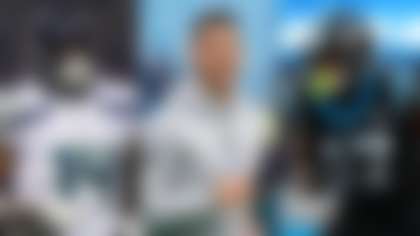Three weeks ago, after soundly beating the New York Jets 30-9 on their own field in New Jersey, the Miami Dolphins had the look of a potential playoff team, with a rookie quarterback leading them back to the promised land.
However, as is often the case when rookies start at quarterback in the NFL, Tannehill hit a wall and the Dolphins followed suit. The Dolphins lost their third consecutive game on Thursday night, dropping a 19-14 decision to the Buffalo Bills. Thus ends the playoff talk, and we're all reminded to have a little patience.
Irish poet and playwright Oscar Wilde said it best back in the 19th century: "Experience is the name everyone gives to their mistakes." Tannehill and the Dolphins clearly need more experience; therefore, they need to make more mistakes.
Tannehill is one of four quarterbacks who were taken in the first round of the 2012 NFL Draft in April and one of five rookie signal-callers to start since opening day. However, it was never the intention of the Dolphins to have Tannehill lead the team this entire season; not because they worried about his talent level, but rather because they wanted to allow him time to grow into the game and adjust, since he was entering pro football with just 19 college starts at quarterback. But in this league, injuries force teams to make adjustments. When David Garrard went down early in training camp, Dolphins coaches called upon Tannehill to start, and he looked surprisingly poised and ready to handle the challenge.
He was not effective on opening day against the Houston Texans. But starting with the Week 2 game against the Oakland Raiders, Tannehill began showing progress, growing each week, gaining more confidence with every throw and leading the Dolphins to three wins in the first six weeks. Not to mention, two of their three losses in that span occurred in overtime. It was clear: Tannehill was rapidly improving.
But suddenly, over the past three weeks, Tannehill has not progressed. He has hit the proverbial "wall" that all rookies hit. What is the wall and why do rookies hit it?
When a rookie starts at quarterback, defensive coaches have to prepare for anything and everything. But after five games the rookie signal-caller's strengths and weaknesses become crystal clear on the game tape. What types of throws he likes, what part of the field he targets the most, how he reacts to the speed of the game, how he handles pressure and how he performs under pressure. Because most rookies are limited in terms of the volume of offense at their disposal, defensive coordinators can get a good read on the young passer and take away what he does best. This cat-and-mouse game is much like a rookie basketball player who loves to go to his right all the time; naturally, the defense learns to force him left. How does he respond? Better question: Can he respond?
Teams now have a read on what Tannehill likes to do, as well as how the Fins have set up their offensive game plan around him. With limitations at wide receiver -- most critically, nobody who is able to stretch the field -- opponents have played more man-to-man against the Dolphins, taking away the easy throws. During the current three-game losing streak, Tannehill hasn't been able to make big plays down the field -- with only two plays over 25 yards -- and Miami has gone just 9-for-34 on third-down conversion attempts. Also, defenses have loaded up on the left side, as most teams realize Miami likes to run behind Pro Bowl left tackle Jake Long. And in the last two weeks, the Dolphins have gotten behind quickly, putting their offense in catch-up mode, which takes away balance in play calling. Adding to the problem: The Dolphins' defense has regressed of late, allowing both the Tennessee Titans and Buffalo Bills to run the ball effectively and control time of possession.
All of these problems are interrelated and certainly not solely the fault of the inexperienced Tannehill. To understand the struggles of Tannehill -- or the effect of "the wall" -- is to understand the Dolphins' broader team problems. Yes, Tannehill has to improve, he has to grow within the offense, but the Fins also have to improve around him in terms of their overall talent level. This was always going to be a rebuilding year for the Dolphins -- and a learning experience for Tannehill. So while these past three losses are painful in terms of their playoff hopes, they also serve as a reminder of what Miami must do to improve.
When the Dolphins can play their style -- which is playing from in front, stopping the opponent's run game and making a few big plays -- Tannehill will look like the best thing to happen to Miami since LeBron hit South Beach. But when they get behind early in games and fail to make big plays, they will struggle. This is the reality of where they are as an organization, so don't get down on Tannehill. Just know that as the team around Tannehill improves, so will he. He can break through this wall -- he just can't do it alone.
Ten thoughts around the NFL
1) All this talk about New York Jets backup quarterback Tim Tebow has diverted attention away from this club's core issue: an underwhelming overall talent level. Examine the Jets' roster from three years ago, then compare it to their talent level today and ask yourself this question: With each move, where have they improved? You could even ask the same question regarding the coaching moves. Former offensive coordinator Brian Schottenheimer was viewed as a problem last year, but was he really the problem or was it their talent level? Now with the St. Louis Rams, Schottenheimer has done some impressive work. Just last week, his offense ran for more yards (159) on the San Francisco 49ers' tough defense than any team in the last two years, gaining the third-most total yards (458) on the Niners in that span. The Jets' fundamental problem is their talent level, not the backup quarterback, not the offensive coordinator. It has been a talent problem all year.
Darlington: Tebow the Terrible
The Jets are stunned Tim Tebow isn't a good practice player? Should have done their homework, Jeff Darlington says. **More ...**
2) But while we're on the subject of Tebow ... His 2013 salary is right around $2.8 million. (If he were to log 55 percent of the snaps this season, the deal would call for an additional $5 million, but this is obviously a moot point.) Tebow is guaranteed about half of his 2013 salary. Therefore, unless the Jets trade him, he will be on the team next year. So the Tebow conversation -- "When will he start?" -- will continue for at least another year in New York.
3) The Detroit Lions' hopes for a playoff season might be lost this week if they are not able to beat the Green Bay Packers. And if there was ever a time for the Lions to win a game against the Packers, this Sunday offers the perfect conditions, as many of the Packers' best players will not be playing. Green Bay will be without DB Charles Woodson, OLB Clay Matthews and RT Bryan Bulaga. All three are tough to replace, but without their best offensive tackle, the Packers now have to worry about protecting quarterback Aaron Rodgers on both edges. Bulaga's injury makes me wonder how Green Bay will fare going forward against teams with great defensive fronts, like the New York Giants (in Week 12), Chicago Bears (Week 15) and potentially the San Francisco 49ers in the playoffs. Can the Lions take advantage of this problem with their defensive front? I'm not sure. But to beat the Packers, they must.
4) Casey Hayward, whom the Packers acquired in April's draft, looks like he will be another one of general manager Ted Thompson's second-round gems. Hayward has a nose for the ball -- as evidenced by his four picks this season -- plays with great toughness and can play inside and outside corner, which is critical. Like star receiver Randall Cobb, who was taken after many other receivers late in the second round of the 2011 NFL Draft, Hayward went late in the second after many other corners and might prove to be the best of them all.
5) All the talk around here in the Philadelphia area centers on who might be the next Eagles coach when owner Jeffrey Lurie decides to make a move. Yup, for the fans, it's not if Lurie makes a move, but when. With seven games remaining in the 2012 campaign, head coach Andy Reid still could possibly save his job, but it will take a lot of wins, as well as rookie Nick Foles playing very well at quarterback. If Foles performs at a high level and the Birds win the next seven games, how does Lurie make a move? Lurie has a number of problems on his hands, including the Eagles' cap situation next year. Philadelphia must decide what to do with some high-priced players like Nnamdi Asomugha, Jason Babin and Michael Vick. This offseason will be completely different for the Eagles, as they must reconfigure their roster and manage the cap.
6) The Tampa Bay Buccaneers have won four of their last five games, despite losing key players at key spots. The "next man up" mentality is prevalent for the Bucs, but I am not sure how they can keep winning games after absorbing more losses on the field. With linebacker Quincy Black placed on injured reserve, Dekoda Watson gets the call. Fortunately, rookie 'backer Lavonte David is playing at a high level. David will be a Pro Bowler soon.
7) Wondering why the Dallas Cowboys have struggled to score this year? Look no further than their third-down conversion rate in the red zone: 3-for-16, ranking 31st in the league. Red-zone third downs are a critical stat to examine each week. The teams that score always have the ability to convert in the red zone, like the New England Patriots, who have converted 16 of their 30 attempts. This week, the 'Boys play the only team worse than them in this area: the Cleveland Browns. Cleveland has encountered a grand total of nine third-down attempts in the red zone, converting just one.
8) Robert Griffin III has played well all season, but not in every aspect of his game. The Washington Redskins rank 31st in third-down conversions. In fact, third down is a bad down for the 'Skins no matter what unit is on the field. Defensively, Washington just can't get off the field, ranking 29th on third downs.
9) Speaking of poor play on offense and defense, the Jacksonville Jaguars are bad all over. But the offense is particularly horrendous, ranking dead last in total offense (263.6 yards per game) and scoring offense (14.1 points per game). Selecting wide receiver Justin Blackmon with the fifth overall pick in April was supposed to help the Jags to become more explosive on offense. But so far, their offense has been far from explosive and Blackmon has been wholly disappointing, struggling to separate from defensive backs, failing to beat man-to-man coverage and averaging less than 10 yards per catch. Jacksonville has managed only 24 plays of 20 yards or more all season.
Darlington: Falcons at a crossroads
So Matt Ryan and Co. finally lost. Now what? Jeff Darlington says only the Falcons can decide how they move forward. **More ...**
10) Matt Ryan has to be included in the MVP conversation, especially considering the Atlanta Falcons' recent defensive woes, particularly their inability to slow down opposing run attacks. The Falcons have controlled the ball for almost 32 minutes a game; and in each of the last three games, their defense has only been on the field for 27 minutes. So, much like the Patriots and Packers of last year, the Falcons are winning due to their ability to control the ball, keep scoring and play from in front. And the biggest reason they can do that is the outstanding play of Matt Ryan.
Follow Michael Lombardi on Twitter @michaelombardi.



